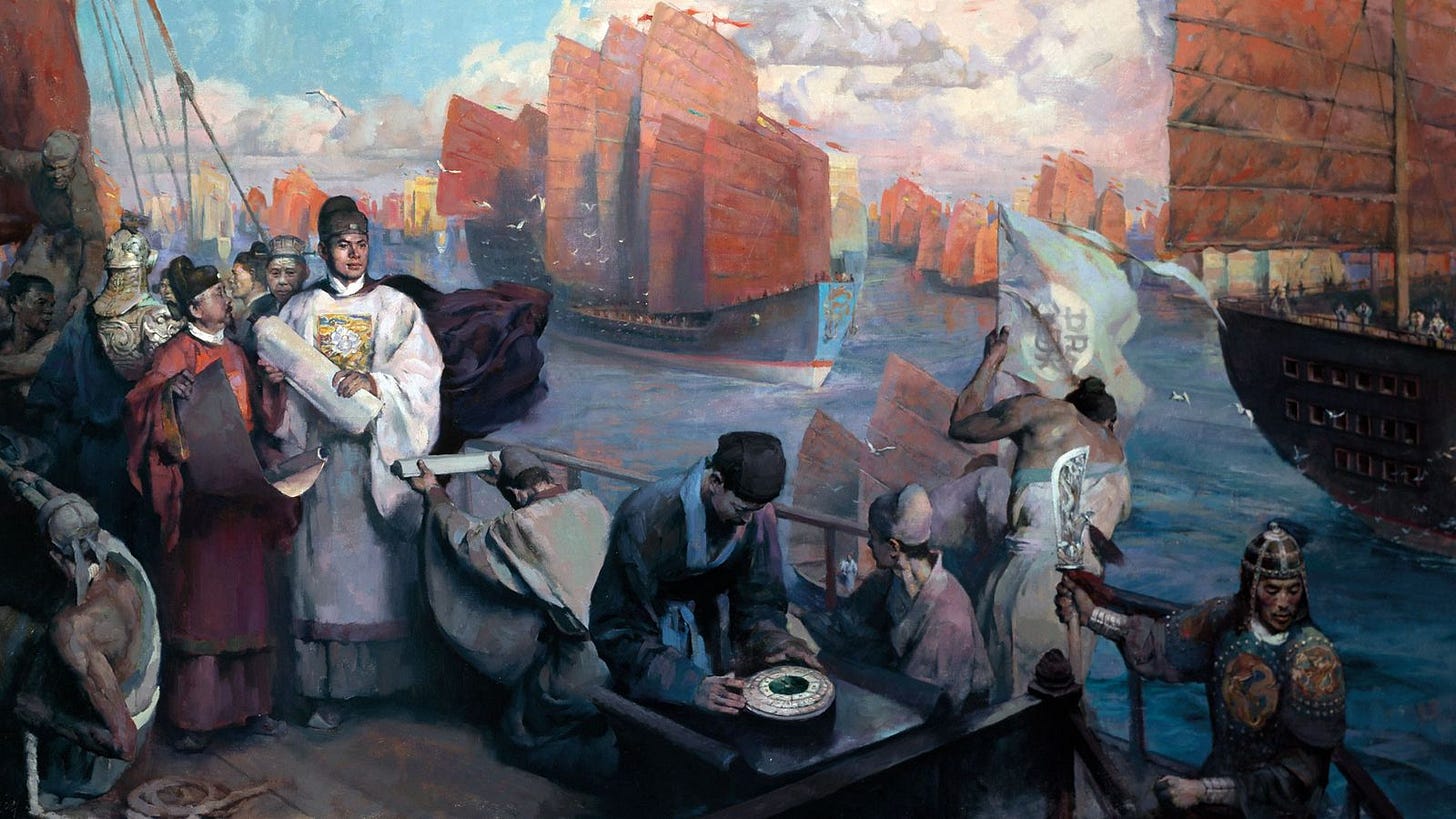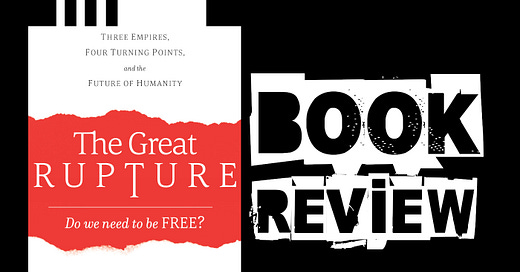There’s a snowball’s chance in the Arctic that The Great Rupture will be my choice for book of the year in 2023. The Rupture combines a glutton’s dollop of history with a basketful of grounded predictions about the tech-estation that’s going to define the next few decades. My humble advice is to read this book…
To summarize in a sentence: The Great Rupture explains why countries like China and Russia failed to develop along the lines of the prosperous West, followed by a prediction of how our world will change as the information age redefines what it means to work and contribute to society.
100 Years of Solitude is the story of Macondo, a small town in the South American that existed well before our time. One of the first chapters sees a tribe of nomadic Gypsies arrive, bearing fantastic novelties and powerful knowledge. The Gypsies delight the townspeople with magnets, shock them with fireworks and hold them captive with billowing clouds of colorful smoke produced from chemical interactions. In short, the Gypsies expose the residents of Macondo to new technology and the stories of discovery reverberate in living rooms and saloons for years.
Fast forward through time; dead and buried now are the citizens of Macondo who were children when the Gypsies first danced through the avenues. As society atrophied the elders stopped passing down knowledge and an entire class of revelation was lost. Upon their eventual return the Gypsies, who’ve maintained knowledge, are surprised to find that once again they can arouse great fervor with the same magic that they’d delighted the townspeople with 100 years previous. Ignorance had wiped clean society’s slate in Macondo.
For reasons I don’t fully understand I found the loss of technology to be one of the most emotionally devastating themes in a book that hits like a sledgehammer.
This I bring to you as a way of introducing The Great Rupture, and a similar scene that Viktor Shvets lays at the reader’s door: a sub-theme of cultural decomposition as nations choose stagnation over development. Case in point China, which was the first country to invent a primitive form of the printing press followed by cutting edge sailing ships. At one point China swaggered around South Asia in their massive junks, projecting power and collecting royalties from obsequious neighbors.
Unfortunately, around the 15th century China elected to close itself off to the world. The great ships were left to rot and technical skills were forgotten to time. Hundreds of years later Western traders would delight the Chinese with inventions that the Chinese themselves had already discovered in prior era, but had failed to keep alive! The decay and regression of civilization.

Why would a nation shun innovation, dismiss technology and slink back down the ladder of evolution? To find out you’ll have to read the book… While I’m going to share several quotes from The Great Rupture, it’s only the veneer on the tabletop. To conduct this review I’ll bring together three timelines from The Great Rupture: past, present and future.
The past
The Rupture tells the historical story primarily through the framework of Russia, the Ottoman empire and China, as compared to “the west.” Viktor asks the question: why did the west choose a path of continual development and technological adaptation, while these other empires chose isolation and a shunning of innovation? In the 15th century…
The Chinese were arguably the most advanced mariners of the age, and they used their towering ships to negotiate trade deals and patronage from nearby countries
Science was flourishing in the middle east and Arabic scholars were at the forefront of academic achievement. The Ottoman empire was well-poised to lead the way in scientific advancement
The Novgorod Republic region, in what is now north-west Russia, was a bastion of merchants and liberal attitudes, at least what constituted liberalism at the time
In many ways these empires were ahead of the west in the 15th century, and had the potential to maintain or expand their position. So what happened? I lived in Russia for a year and I can tell you firsthand that today’s America kicks Russia’s ass in just about every metric (apart from perhaps the number of beautiful women). If Russia and America started in roughly the same place 500 years ago, they’ve ended up at very different destinations.
The Ottoman empire banned the printing of Arabic texts, the Chinese banned foreign trade while the emerging Russia empire swallowed the Novgorod Republic and replaced its liberal tendencies with an autocratic governance structure. Authoritarian rule and the desire to keep society safe and static prevented these empires from keeping up with the “freer” west.
In order to be productive and prosperous, societies must be free. It was the lack of freedom that condemned all non-Western societies to misery, irrelevance, and sometimes to political disintegration. It was freedom that enabled San Francisco to prosper while its absence condemned Vladivostok.
It is beyond the scope of this review to explain the myriad of reasons that these empires chose putrefaction over progress, suffice to say that in the moment the reasoning appeared rational. As per the following quote, we could say that the “underlying heartbeat” is a fear of change. Better to hold onto the today’s mess than to take a chance on tomorrow’s horror.
It is true that political scientists and economists tend to overanalyze reasons for certain actions (trying to find some underlying logic), or, as Emerson wisely advised, “in analyzing history do not be too profound, for often the causes are quite superficial.” Nevertheless, there is always an “underlying heartbeat” that despite all the noise points to the core driving force that, while not making a “folly” inevitable, certainly predispose societies and their leaders toward it.
The present
As a teenager growing up in Kiev (the USSR is still a going concern) ,Viktor Shvets is given a radio and instructed that if he’s going to listen to foreign stations he should only do so quietly and at night. Viktor asks,
What state penalizes a teenager for listening to foreign radio stations, and what price do they ultimately pay? On the other hand, why do others [states] embark on a different course and develop much freer and more prosperous societies?
Clearly a society that punishes teenagers for listening to foreign radio stations ought to do some soul searching. Today’s China, Russia and Turkey (representing the deprecated Ottoman empire) all have a standard of living well below the west. Viktor attributes much of that inferiority to despotic rule and close-minded institutions.
That being said, the west is now facing its own problems. Here’s Viktor describing falling productivity in a statement that bears striking similarity to themes I covered in my review of The Rise and Fall of American Growth.
I argue that it was a secular slowdown in global productivity that commenced in the mid-to-late 1970s and accelerated into the 1980s-2000s that forced societies to choose whether to accept slower growth and lower long-term pay structures (reflecting lower productivity) or whether people would continue to be rewarded, albeit in a different form. In other words, instead of income, societies decided that wealth would be created through asset prices and leveraging.
Viktor proposes that our unnatural levels of indebtedness and hyper-financialized economy are tools we’ve used to paper over a decline in productivity. Furthermore, it’s not only absolute productivity that matters, but the rate of change.
The key to most political, societal, and economic behavior is to be found in the pace of change in marginal utility and pricing power. As psychologists (from Maslow to Myers-Briggs) highlighted, it is our perception of our worth and our relative positioning within the group that determines how we feel about ourselves, societies, and pretty much everything else.
Productivity has been slowing for decades in the west. Our institutions are fraying faster than cheap sweaters, and numerous polls have shown that the younger generations don’t believe in democracy the same way the old timers do. There is clear support from the millennials for a strongman leader, and this comes at a time when we’re about to enter into a period of unprecedented technological development. How’s this all going to work out? Are liberal democracies going to survive?
The future
It’s worth reading the Rupture just to hear Viktor Shvets describe the future. Viktor’s key argument is that AI is going to reach the point that it becomes “good enough” to fill any number of roles (see my recent article on how ChatGPT is going to replace entry level positions). At risk of redundancy are accountants, paralegals, computer programmers, managers, writers, graphic designers and many others. The implementation of AI will lead to tens of millions of layoffs, and a new class of people who can’t find work anywhere because the jobs no longer exist.
Over the next decade or two, almost all occupations will experience a sinking feeling of declining functionality and marginal pricing power. However, even that will not be the end of the story, as doctors, lawyers, educators, composers, and writers will also be swept into the same maelstrom of irrelevance. By the time a truck driver or a PhD in computer science feel that their contribution is eroding, it is doubtful that there will be any other jobs that will still be available for them.
In regards to the AI revolution Viktor makes the incontrovertible assertion that automation and AI are going to lead to discord and explosive societal tension. For example, there is a classic joke in the crypto community that if you fail as a trader degenerate speculator you can always get a job at McDonald’s.
However, America’s most popular restaurant recently unveiled a mostly automated branch.* In the brave new future we’re hurtling towards you won’t even be able to get a job as a cashier insult sponge at the obesity factory. What will society look like then?
*The line cooks are still Homo sapiens, for now…
The Rupture ends with Viktor asking: are the western liberal democracies going to provide the best governance structures to manage the AI transition, or might the authoritarian regimes be better suited to the task? For example, Viktor imagines a scenario in which AI runs a planned economy that is more efficient than Adam Smith’s invisible hand. If total AI control turns out to be the best method of generating growth, then after centuries of embarrassing results the authoritarian regimes might finally be in a place to outperform the west.
While Viktor offers several half-hearted guesses as to the outcome of CCP vs. Senate in the case of AI rule, ultimately my interpretation of his message is that we just don’t know. There are so many factors at play that trying to predict AI’s role and effect on government response is nearly impossible. If we find democratic solutions that allow us to keep our societies intact during this difficult transition, then the information revolution could lead to another 500 year golden age for the west. If not, well… I hear reeducation camps are actually quite fun if you have the right attitude.
All good things must end
I discovered Viktor Shvets after coming across this interview he did with Mike Green. This is a great video and worth watching. I’ve also heard rumors that Mike will be having Viktor on for an interview in February on his Simplify Asset Management channel. Let’s hope that happens.
I’ll conclude with a bit of prose from the Chinese sailor, Zheng He. Who is Zheng He? Let’s ask our future AI overlords…
I’ve included these words because I find the writing beautiful, I hope you enjoy.
Altogether more than thirty countries, large and small, were visited to unify seas and continents and we have traversed more than 100,000 li of immense water spaces and beheld in the ocean huge waves like mountains rising in the sky, and we have set eyes on barbarian regions far away hidden in blue transparency of light vapors, whilst our sails, loftily unfurled like clouds day and night.
Every Sunday I publish a recap of all the best finance articles and podcast episodes I’ve found thought-provoking. Here’s the latest edition.
If you’d like to get this free newsletter straight to your inbox just enter your email below 👇









It seems to me that our overlords are driving the West towards a fully automated, entirely authoritarian future which delivers greater and greater material wealth - at least for the 1% (the rest of us appear destined to become serfs, living in a virtual reality pods). The million dollar question is how the people will react. If the Dutch farmer's protests are anything to go by, the answer is: not well. But pivoting away from the AI hellscape means giving up our dependency on material wealth, and finding wealth instead in other things, like relationships and work that gives satisfaction. Can we do it?